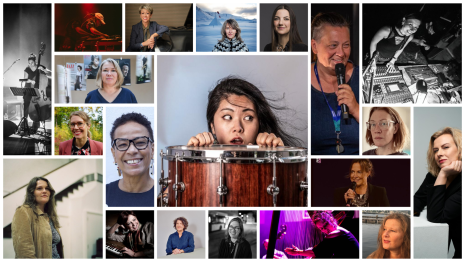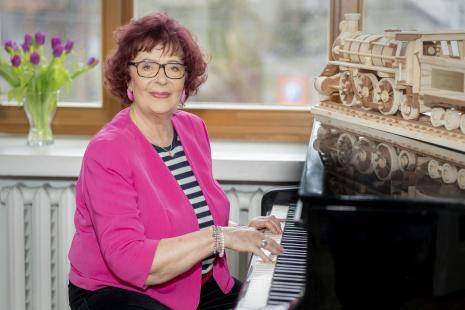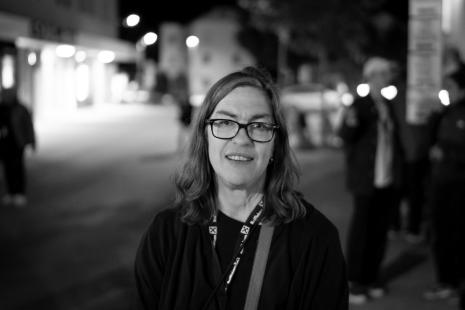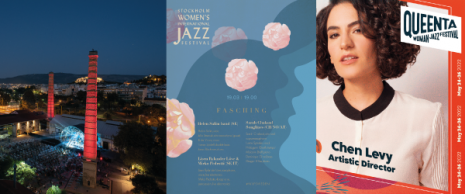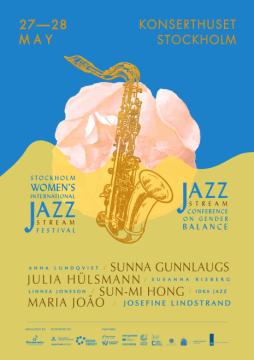Back to list
#WomenToTheFore 2: Janine Irons MBE
We talk to Janine Irons MBE, Co-founder and Chief Executive of Tomorrow’s Warriors. Tomorrow’s Warriors is a leading music development charity based in London, set up by Janine and her partner, musician Gary Crosby.
Over 30 years, it has developed and supported thousands of talented young musicians, with a focus on those under-represented in the jazz and creative music sector, including Black artists and women artists.
In 2020, Music Week recognised Janine as a gamechanger in the music industry, and added her to its Women in Music Roll of Honour.
What led you to the jazz creative music sector, and how would you describe your career path?
I've always been involved in arts one way or another but it’s been an unconventional career path. I studied classical piano from a young age, but in my teenage years going to discos and hanging out with friends was more fun! I ended up joining a funk band as lead vocalist.
I had a troubled school life. It was never a comfortable place for me - a creative person in a very academic environment and I didn’t conform. I went to Catholic convent schools that had a strange attitude towards Black people - almost a missionary thing, that they would save you.
If I saw unfairness or injustice, I would rail against it and I’ve always had this sense of civic duty. I would volunteer and fundraise and at one point volunteered as a nurse at weekends.
At 18, I worked in a fashion store in Covent Garden and then went to the Laban dance conservatoire. After a job at Boosey and Hawkes, I ended up in the City of London, and worked in a corporate banking environment for 13 years, which is where I honed my skills in administration.
I was struggling in this non-creative environment, where everything was about money, so I went to evening classes to study photography. That led me to a Jazz Jamaica gig, where I met Gary back in 1993.
We both got talking about what the jazz world was like, and he took me to the Jazz Cafe to see the jam session that he was running. And there I discovered all these young Black musicians, all of these great talents that were getting no wider exposure.
It troubled me. I mean, this is music that was created by Black people. I just couldn’t understand why these musicians weren’t more visible. It just raised more and more questions for me. And then we set about trying to change it.
Did you have any early mentors who particularly inspired you?
I often regret that I didn't have a mentor. I see the value of it now, and I mentor some women as well as young men, but I really wish I had had one.
I was misunderstood in the schools that I went to but was lucky to have some teachers who did recognise my talents and would steer me to using them in a positive way.
I do credit Gary with helping me find myself and my place in life, doing something where I can bring value. Something that I enjoy and where I can make a difference, because I think that's the thread that runs through my life, it's all about where can I make a difference?
Can you tell us more about the inspiration behind Tomorrow’s Warriors?
The Jazz Cafe gig was the spark for me and Gary to set up Tomorrow's Warriors. It was about looking at the problem and thinking about what needs to happen. Where can we have the most impact?
We talked long into the night about all the different things that needed to be done. Do the Right Thing, the Spike Lee film, was a particular inspiration. There's a bit in it where they're in Harlem in an Italian pizza joint and there's lots of pictures of all these white jazz singers and film stars on the wall. Mookie, a character in the film who comes to the restaurant regularly, asks, “How come I can't see any of my brothers on the wall? We're here in Harlem, how come?” And the restaurant owner says to him, effectively - “You want to see your brothers on the wall, go build your own wall”.
That was what inspired us and kick-started us into laying the first bricks.If we want the wall to look a certain way, we have to build that wall ourselves.
We asked ourselves, how can we make sure that people who look like us and come from similar backgrounds can be more visible and inspire more people? We realised we needed to change who's on the stage and that this would lead to changing who comes to see what's on stage. And then the next part of the problem was: Where are the teachers? Where are the executives?
So it was one brick at a time. And now 30 years on, we've built a wall. It's a much bigger wall than it was. There's a lot more people on it, and they're inviting more and more people. Hopefully, the plan is that they will come, and they will carry on building it long after we've gone.
How has Tomorrow’s Warriors work evolved over the past 30 years?
When we started it was first and foremost about giving Black musicians a platform and helping them get on the next rung of the ladder, but also about diversifying more broadly, so that the scene reflected the society that we live in.
And then, as we started to progress in that area, it became very obvious that there was a lack of women on the scene.
We were asking, where are they, how can we get them to engage? And the message that came back was that the women didn’t like all this testosterone on the stage, the horn players playing a million notes a second!
So we created an environment that is supportive of women playing this music, including a female collective to give women a space where they could play music and support and challenge each other.
We gave them extra time and space and then made sure they got back in the room with the boys and took them on, on their own terms.
Another shift we made was thinking about socio-economic backgrounds. A lot of young people can't afford to get quality training. You need to have people who have resources in the room with people who don't. That's how you can help level up everybody. It’s been a successful approach for us; having people from middle-class backgrounds working with people from working class backgrounds, and then they all end up working together and everyone rises.
We've also worked with a lot of neurodivergent young people and have provided a really safe and comfortable space, especially for those who don't thrive in those more formal educational environments.
Community is really important. That ‘each one, teach one’ ethos - we give them up to 15 years free training, and there’s an unspoken quid pro quo that you come back and you support the next generation.
Over 30 years, it has developed and supported thousands of talented young musicians, with a focus on those under-represented in the jazz and creative music sector, including Black artists and women artists.
In 2020, Music Week recognised Janine as a gamechanger in the music industry, and added her to its Women in Music Roll of Honour.
What led you to the jazz creative music sector, and how would you describe your career path?
I've always been involved in arts one way or another but it’s been an unconventional career path. I studied classical piano from a young age, but in my teenage years going to discos and hanging out with friends was more fun! I ended up joining a funk band as lead vocalist.
I had a troubled school life. It was never a comfortable place for me - a creative person in a very academic environment and I didn’t conform. I went to Catholic convent schools that had a strange attitude towards Black people - almost a missionary thing, that they would save you.
If I saw unfairness or injustice, I would rail against it and I’ve always had this sense of civic duty. I would volunteer and fundraise and at one point volunteered as a nurse at weekends.
At 18, I worked in a fashion store in Covent Garden and then went to the Laban dance conservatoire. After a job at Boosey and Hawkes, I ended up in the City of London, and worked in a corporate banking environment for 13 years, which is where I honed my skills in administration.
I was struggling in this non-creative environment, where everything was about money, so I went to evening classes to study photography. That led me to a Jazz Jamaica gig, where I met Gary back in 1993.
We both got talking about what the jazz world was like, and he took me to the Jazz Cafe to see the jam session that he was running. And there I discovered all these young Black musicians, all of these great talents that were getting no wider exposure.
It troubled me. I mean, this is music that was created by Black people. I just couldn’t understand why these musicians weren’t more visible. It just raised more and more questions for me. And then we set about trying to change it.
Did you have any early mentors who particularly inspired you?
I often regret that I didn't have a mentor. I see the value of it now, and I mentor some women as well as young men, but I really wish I had had one.
I was misunderstood in the schools that I went to but was lucky to have some teachers who did recognise my talents and would steer me to using them in a positive way.
I do credit Gary with helping me find myself and my place in life, doing something where I can bring value. Something that I enjoy and where I can make a difference, because I think that's the thread that runs through my life, it's all about where can I make a difference?
Can you tell us more about the inspiration behind Tomorrow’s Warriors?
The Jazz Cafe gig was the spark for me and Gary to set up Tomorrow's Warriors. It was about looking at the problem and thinking about what needs to happen. Where can we have the most impact?
We talked long into the night about all the different things that needed to be done. Do the Right Thing, the Spike Lee film, was a particular inspiration. There's a bit in it where they're in Harlem in an Italian pizza joint and there's lots of pictures of all these white jazz singers and film stars on the wall. Mookie, a character in the film who comes to the restaurant regularly, asks, “How come I can't see any of my brothers on the wall? We're here in Harlem, how come?” And the restaurant owner says to him, effectively - “You want to see your brothers on the wall, go build your own wall”.
That was what inspired us and kick-started us into laying the first bricks.If we want the wall to look a certain way, we have to build that wall ourselves.
We asked ourselves, how can we make sure that people who look like us and come from similar backgrounds can be more visible and inspire more people? We realised we needed to change who's on the stage and that this would lead to changing who comes to see what's on stage. And then the next part of the problem was: Where are the teachers? Where are the executives?
So it was one brick at a time. And now 30 years on, we've built a wall. It's a much bigger wall than it was. There's a lot more people on it, and they're inviting more and more people. Hopefully, the plan is that they will come, and they will carry on building it long after we've gone.
How has Tomorrow’s Warriors work evolved over the past 30 years?
When we started it was first and foremost about giving Black musicians a platform and helping them get on the next rung of the ladder, but also about diversifying more broadly, so that the scene reflected the society that we live in.
And then, as we started to progress in that area, it became very obvious that there was a lack of women on the scene.
We were asking, where are they, how can we get them to engage? And the message that came back was that the women didn’t like all this testosterone on the stage, the horn players playing a million notes a second!
So we created an environment that is supportive of women playing this music, including a female collective to give women a space where they could play music and support and challenge each other.
We gave them extra time and space and then made sure they got back in the room with the boys and took them on, on their own terms.
Another shift we made was thinking about socio-economic backgrounds. A lot of young people can't afford to get quality training. You need to have people who have resources in the room with people who don't. That's how you can help level up everybody. It’s been a successful approach for us; having people from middle-class backgrounds working with people from working class backgrounds, and then they all end up working together and everyone rises.
We've also worked with a lot of neurodivergent young people and have provided a really safe and comfortable space, especially for those who don't thrive in those more formal educational environments.
Community is really important. That ‘each one, teach one’ ethos - we give them up to 15 years free training, and there’s an unspoken quid pro quo that you come back and you support the next generation.
Tomorrow's Warriors has nurtured some exceptional musicians - Nubya Garcia, Shabaka Hutchings, Zara McFarlane, Denys Baptiste, Soweto Kinch. Which up and coming female / non-binary artists are you most excited about at the moment?
Amy Gadiaga is a brilliant double bassist and Maddie Coombes, a tenor sax player, is extraordinary.
Mali Sheard on alto sax has just started studying at Royal Academy of Music and is also an extraordinary musician. Roella Oloro is a pianist in her final year at Berklee in the US, who’s also a Warrior. On the brass, there’s Anoushka Nanguy on trombone and Hanna Mbuya on tuba/bass trombone. And there are plenty more coming up behind them!
What advice would you give to aspiring musicians, particularly women / non-binary artists and those from underrepresented communities, who are interested in pursuing a career in the creative music sector?
Be bold, be fearless, be a warrior!
Don't be scared, just keep pressing forward.If you're a woman there are enough barriers, and if you're a Black woman, there are even more. You need to just keep pushing through. I know it can be really tough. For the most part, when you're trying to establish yourself in the industry, people want results.
You have to prove yourself. Being Black or being a woman is not enough in itself, you know, you still have to be able to compete in the market. So I encourage all of our young people and particularly the women and the people of colour, be as good as you can be and always be true to yourself. Be authentic, don’t be driven by the market.
What have been your most memorable moments of your career?
I've had so many memorable times. I should probably do a memoir at some point!
But, overall, the most impactful moment was probably the day I met Gary. That changed everything. It was such a serendipitous moment. If we hadn’t met then none of this might have happened and then where would we be?
So for all the struggles I had as a young person, I can be grateful because it made me a stronger person and very resilient. And I needed to be resilient to get this far in the industry.
The day I met Gary changed not only the course of our lives, but also jazz in the UK and beyond. Lots of people around the world look to Tomorrow's Warriors for inspiration which is really rewarding.
We're all here for a purpose. And there's nothing that gives me more pleasure than seeing all these young people succeeding, you know.
And I'm looking at several generations of Warriors now, and it's like having this huge extended family. It's great. And they all look out for each other. You get that real sense of love for each other, and for the entire Warriors community.
How do you see the future of jazz and creative music, and what is Tomorrow's Warriors' role in shaping it?
I think things are changing for the better. Musicians are a lot more business savvy and this changes the power dynamics. One of the problems we’ve got is the lack of equity that people of colour have in the industry. That's changing and the more we can educate our young people about running businesses, the better.
Some of the musicians we're working with, they've set up their studios or their companies, publishing companies and production companies, they own it. And when you own it, you're in a stronger position.
In London in particular, its increasing diversity means all these different cultures coming together and getting involved in the music. And the music itself is evolving. And that's a good thing. There'll be the purists that say it's awful but jazz can't become a museum piece. Of course we need to respect the jazz tradition and its legacy, but each generation must be allowed to bring their authentic self to the music. So I think jazz will continue to grow in popularity. It’s in a good place just now and has gone beyond where any of the British jazz waves have gone before.
I think there'll be more changes in education. I hope schools will be more open to jazz and we can stop music teachers being scared of jazz, inspiring them to embrace it and educating them on how to teach it.
In America, jazz is their culture and I think it will get more embedded in our culture here in the UK. So that can only be a good thing.
And we'll have more women in jazz! The female musicians coming through at the moment are really strong. They’re damn good and you have to be better than the boys to get there in the first place. That’s how good they are.
Photographer credits:
1) Fabrice Bourgelle
2) Graeme Miall
3) Graeme Miall
Amy Gadiaga is a brilliant double bassist and Maddie Coombes, a tenor sax player, is extraordinary.
Mali Sheard on alto sax has just started studying at Royal Academy of Music and is also an extraordinary musician. Roella Oloro is a pianist in her final year at Berklee in the US, who’s also a Warrior. On the brass, there’s Anoushka Nanguy on trombone and Hanna Mbuya on tuba/bass trombone. And there are plenty more coming up behind them!
What advice would you give to aspiring musicians, particularly women / non-binary artists and those from underrepresented communities, who are interested in pursuing a career in the creative music sector?
Be bold, be fearless, be a warrior!
Don't be scared, just keep pressing forward.If you're a woman there are enough barriers, and if you're a Black woman, there are even more. You need to just keep pushing through. I know it can be really tough. For the most part, when you're trying to establish yourself in the industry, people want results.
You have to prove yourself. Being Black or being a woman is not enough in itself, you know, you still have to be able to compete in the market. So I encourage all of our young people and particularly the women and the people of colour, be as good as you can be and always be true to yourself. Be authentic, don’t be driven by the market.
What have been your most memorable moments of your career?
I've had so many memorable times. I should probably do a memoir at some point!
But, overall, the most impactful moment was probably the day I met Gary. That changed everything. It was such a serendipitous moment. If we hadn’t met then none of this might have happened and then where would we be?
So for all the struggles I had as a young person, I can be grateful because it made me a stronger person and very resilient. And I needed to be resilient to get this far in the industry.
The day I met Gary changed not only the course of our lives, but also jazz in the UK and beyond. Lots of people around the world look to Tomorrow's Warriors for inspiration which is really rewarding.
We're all here for a purpose. And there's nothing that gives me more pleasure than seeing all these young people succeeding, you know.
And I'm looking at several generations of Warriors now, and it's like having this huge extended family. It's great. And they all look out for each other. You get that real sense of love for each other, and for the entire Warriors community.
How do you see the future of jazz and creative music, and what is Tomorrow's Warriors' role in shaping it?
I think things are changing for the better. Musicians are a lot more business savvy and this changes the power dynamics. One of the problems we’ve got is the lack of equity that people of colour have in the industry. That's changing and the more we can educate our young people about running businesses, the better.
Some of the musicians we're working with, they've set up their studios or their companies, publishing companies and production companies, they own it. And when you own it, you're in a stronger position.
In London in particular, its increasing diversity means all these different cultures coming together and getting involved in the music. And the music itself is evolving. And that's a good thing. There'll be the purists that say it's awful but jazz can't become a museum piece. Of course we need to respect the jazz tradition and its legacy, but each generation must be allowed to bring their authentic self to the music. So I think jazz will continue to grow in popularity. It’s in a good place just now and has gone beyond where any of the British jazz waves have gone before.
I think there'll be more changes in education. I hope schools will be more open to jazz and we can stop music teachers being scared of jazz, inspiring them to embrace it and educating them on how to teach it.
In America, jazz is their culture and I think it will get more embedded in our culture here in the UK. So that can only be a good thing.
And we'll have more women in jazz! The female musicians coming through at the moment are really strong. They’re damn good and you have to be better than the boys to get there in the first place. That’s how good they are.
Photographer credits:
1) Fabrice Bourgelle
2) Graeme Miall
3) Graeme Miall

